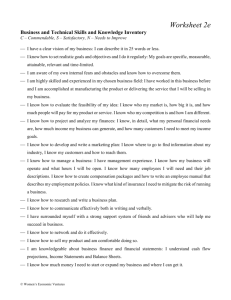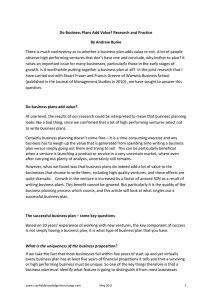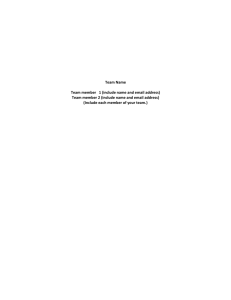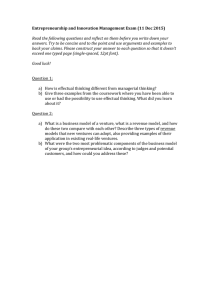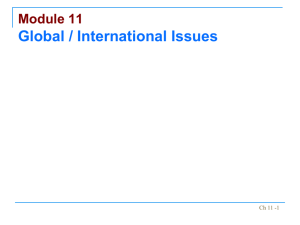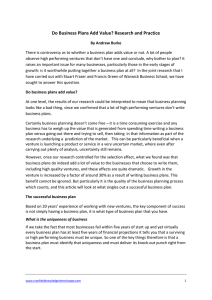Cranfield University – Embed Project Transcript of Audio Interview
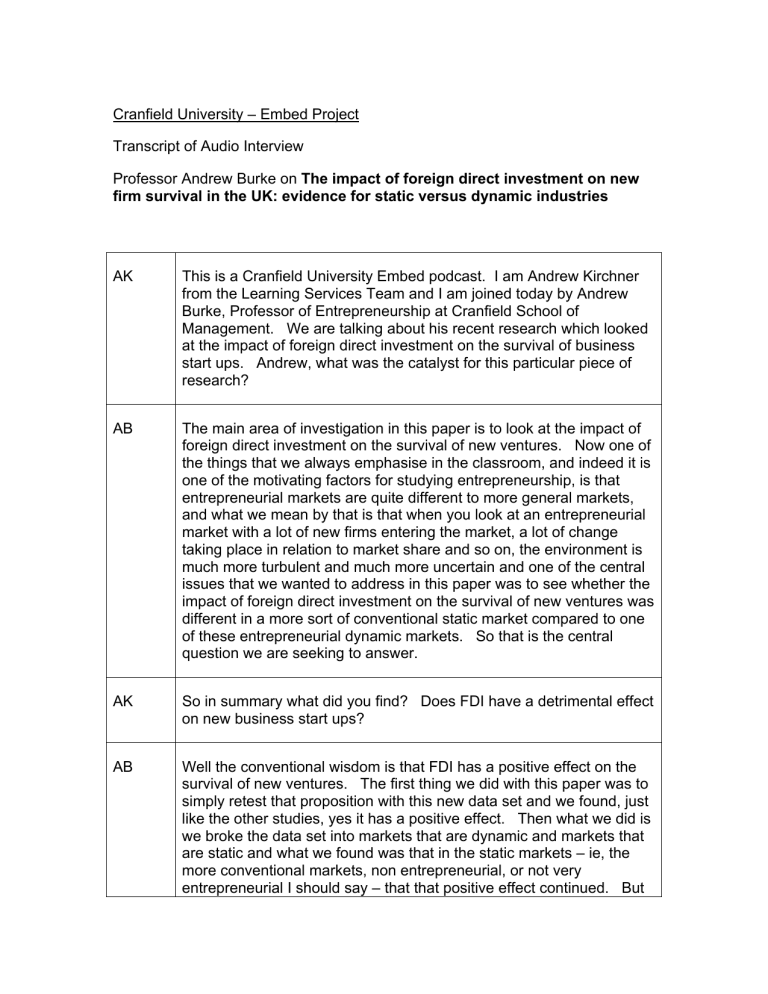
Cranfield University – Embed Project
Transcript of Audio Interview
Professor Andrew Burke on The impact of foreign direct investment on new firm survival in the UK: evidence for static versus dynamic industries
AK This is a Cranfield University Embed podcast. I am Andrew Kirchner from the Learning Services Team and I am joined today by Andrew
Burke, Professor of Entrepreneurship at Cranfield School of
Management. We are talking about his recent research which looked at the impact of foreign direct investment on the survival of business start ups. Andrew, what was the catalyst for this particular piece of research?
AB
AK
AB
The main area of investigation in this paper is to look at the impact of foreign direct investment on the survival of new ventures. Now one of the things that we always emphasise in the classroom, and indeed it is one of the motivating factors for studying entrepreneurship, is that entrepreneurial markets are quite different to more general markets, and what we mean by that is that when you look at an entrepreneurial market with a lot of new firms entering the market, a lot of change taking place in relation to market share and so on, the environment is much more turbulent and much more uncertain and one of the central issues that we wanted to address in this paper was to see whether the impact of foreign direct investment on the survival of new ventures was different in a more sort of conventional static market compared to one of these entrepreneurial dynamic markets. So that is the central question we are seeking to answer.
So in summary what did you find? Does FDI have a detrimental effect on new business start ups?
Well the conventional wisdom is that FDI has a positive effect on the survival of new ventures. The first thing we did with this paper was to simply retest that proposition with this new data set and we found, just like the other studies, yes it has a positive effect. Then what we did is we broke the data set into markets that are dynamic and markets that are static and what we found was that in the static markets – ie, the more conventional markets, non entrepreneurial, or not very entrepreneurial I should say – that that positive effect continued. But
AK we found that in the dynamic markets that the spillover effect was actually negative, that foreign direct investment increases the failure rate among new ventures. Now the main reason for this and it is part of the theory in the paper, if you look at the impact of foreign direct investment on survival of new ventures you can see a number of different possible effects. On one hand, on the positive side, you will see there is knowledge spillover effects from foreign firms locating in the UK or any other country on new ventures – new ventures benefit from that knowledge and it helps their performance. Likewise you often see linkages between new ventures and multinationals. New ventures supplying products or new ventures being actually further down the supply chain in terms of dealing with consumers. But in addition there is obviously competitive effects, and what really the bottom line of this study is pointing out is that in the dynamic markets new ventures are more likely to be competing with foreign companies than they are in static markets. And indeed that kind of makes sense because if you think about it in a static market the dominant players in the industry are already pretty much established, so if you think of it from an entrepreneurs point of view if you enter a market like that you are facing entrenched competitors and therefore the likelihood is that you will either try to avoid competition with these firms by looking for a niche that they are not in, or alternatively you look for opportunities to actually maybe supply these firms or offer a parallel service alongside these firms. So, the results seem to square up that entrepreneurs are actually undertaking that sort of strategy. If you move across to dynamic markets, well then what you find in these type of markets is that there is a new innovation taking place. Now that doesn’t always have to be in terms of a new technology or something quite dramatic – it can be something quite simple like deregulation of an industry and I think the airline industry is a very good example of that. As the deregulation in the industry opened opportunities for new entrants in the market, the market became – a market that was once very static, became very, very turbulent and therefore in a market like this you can find that foreign firms entering the market are actually direct competitors with the new ventures, and hence not surprisingly then you get this negative spillover effect. So for example, if you take the
UK, you could take Ryanair for example which is locating a huge amount of its operations in the UK, that constitutes foreign direct investment – what impact does that have against British business start ups? Well we can take our own Robert Wright here from Cranfield, who launched Wizz Air, basically these firms are in competition with the foreign firms and hence you are going to get a negative effect.
What are the implications, in practice, for business community, for entrepreneurs, for policy makers?
AB Well, I think the lesson for entrepreneurs in a sense we have covered it a little bit, I mean I think the lesson is that entrepreneurs have to really understand the market and indeed, the best entrepreneurs do that exceptionally well. So, in terms of understanding where the competitive threats are, where the market gaps are, and so on and weighing up your strategy against those of other firms, the results just seem to effectively reflect that, but what they do suggest though is that it is much harder to avoid competition in dynamic markets and not surprisingly then, the failure rate in dynamic markets is much higher, but on the other side the upside is much greater – if you can actually be a successful firm in the dynamic market you typically become one of the dominant firms, so it is the trade off between being in a high risk, high reward market versus a low risk, low reward market. In terms of policy, I think the policy angle is interesting because very often you find that people want very straightforward answers in terms of is foreign direct investment a good thing? Is it a bad thing? Should we be trying to grow our own companies, rather than seeking foreign companies, and I think if you simply took this paper and the results of this paper at face value I think you would come up with a misleading recommendation. The recommendation that you might take from the paper is to say, oh well, foreign direct investment is a bad thing for entrepreneurial markets because look here we have got a Cranfield result showing that it is actually reducing the survival of British new ventures. The truth is that we don’t really know whether that negative effect is so strong that one would want to discourage foreign direct investment and we have got to take into consideration other research and practical experience and common sense and if we take into consideration some other research in this area, what you see with foreign direct investment and particularly the location of new companies when they move from one country to another, is that they build up expertise in that particular industry and what we know about successful ventures is that entrepreneurs typically have industry experience in the sector that they launching their venture, so they typically understand the business models, the technologies, the processes, the logistics, all the best suppliers and all that sort of thing in terms of launching in the market. And also they understand the consumer incredibly well. So for example, if you take a company like
Microsoft and take a look at their foreign direct investment in Ireland, in a case like that it looks like foreign direct investment is unambiguously have a positive effect because Ireland didn’t have a software industry before Microsoft arrived, so in terms of displacement or that negative effect that we have talked about in our paper, it would have been very minimal in terms of the competition effect with indigenous Irish industry, but what happened was that they hired a lot of university graduates, these people built up expertise not just on the software side, but ultimately on the marketing side and now what you have got
AK
AB in Ireland is a whole bunch of offshoots from Microsoft. So after a period of time you find people leaving the company and starting up their ventures and you get this spawning effect from foreign direct investment and these ventures tend to be more successful because you have got the industry experience and so on and they tend to be more successful than start up without such an experience. So in a sense the foreign direct investment acts like a real world university – a training ground. On the other hand, if you take – so the lesson really here is whether the foreign direct investment is coming into a well established industry, or whether it is coming into effectively a green field or new industry because if we go back to the airline industry, and back to the UK example, if you take a look at Ryanair’s entry into the
UK market, Britain is not short of expertise in the airline industry on any level and therefore had Ryanair not gone in, would a British low cost carrier have been set up and been created, well the answer I think is almost certainly yes, and going back to the Robert Wright example, we can see Wizz Air has been set up and had Ryanair not gone in, would the UK have a low cost carrier of its own? The answer is probably yes. As it is, it has got a Greek low cost carrier and an Irish one. So, yes, I think in terms of the policy then, it tells you that the policy has to be discerning and has to look at each industry and each case on its own merit and to realise that the successful policy entails a blended mix of foreign direct investment with new venture creation policies.
Where is your research taking you now? Obviously this paper has concentrated on the UK and you mentioned Ireland as well, are you going to look at other regions/countries in the world?
Well the paper actually have created a lot of interest in the international research community because apart from this FDI result, one of the main eye openers for other researchers is the fact that markets work very differently – dynamic markets work very differently to static markets and therefore most research up to now has not made any distinction between those two different markets settings and what we are saying is look, these markets are so different that you can’t do research without distinguishing one from the other. So its borne a lot of international research in terms of people now beginning to use the same technique in terms of breaking the datasets. This procedure is permeating everything else we are doing as well because for example, the current round of research that we are looking at the moment is trying to see whether we can identify a sustainable number firms in any particular industry and if we can, then ask the question what happens when the number of firms is above the sustainable level or below the sustainable level. I suppose in strategy jargon this is whether a
AK market overshoots or undershoots, or in a bubble or in a slump and what we find in relation to that research is that those effects are in play, but what we are interested in is to see whether the adjustments in the market in those circumstances is different in dynamic and static market. So whether for example, if there are too many firms in an industry how smart are entrepreneurs in realising that there are too many firms in a particular industry and can they read a static market better than a dynamic market because everything would indicate that they should be able to read a static market with lots of history to fall back on and past observations. For a dynamic market it is much more difficult to look at. So that is something we are working on at the moment, but basically I think this distinction is pretty core to a general interest in entrepreneurship and I think for example, on the MBA programme, if we go back to what is being taught in the textbooks, they basically place a lot of emphasis on the fact that entrepreneurial markets are different but so far what has been lacking is some research to actually back up that that is true. So it has encouraged us to press on and to shed some more light on this area.
Andrew, thank you very much indeed.
© Cranfield University 2008
